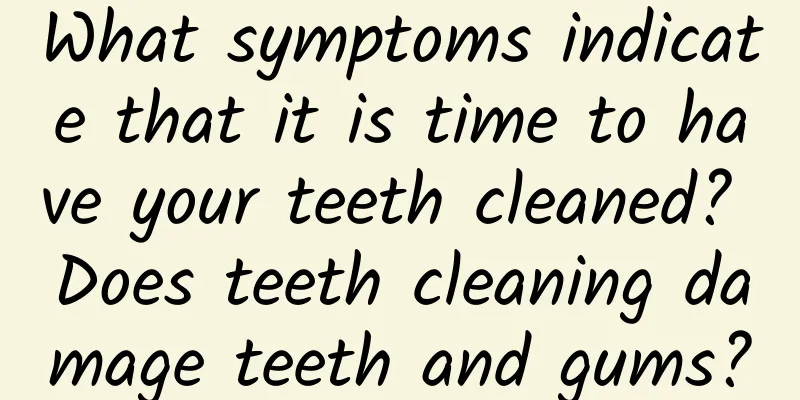What symptoms indicate that it is time to have your teeth cleaned? Does teeth cleaning damage teeth and gums?

|
Author: Xu Li, Chief Physician, Peking University School of Stomatology Standing Committee Member of the Periodontology Committee of the Chinese Stomatological Association Reviewer: Hou Benxiang, Chief Physician, Beijing Stomatological Hospital, Capital Medical University Deputy Secretary General of the Chinese Stomatological Association Some people think that their teeth are very white and they pay attention to brushing their teeth regularly. Does that mean they don’t need to have their teeth cleaned? The so-called whiteness mainly refers to the surface of the teeth. In fact, the weakest spot for periodontal disease is between two teeth. It is difficult to brush your teeth and bacteria can easily be retained. It is best to go to the hospital for a check-up and a exploratory examination. Some people have beautiful porcelain teeth, and their teeth look very white, but their gums are red and swollen, which may indicate inflammation, and are actually unhealthy. Therefore, if you want your teeth to look very white, you should also have regular oral examinations and regular teeth cleanings. 1. What symptoms indicate that you need a teeth cleaning? If you bleed when you brush your teeth or there are blood stains on your toothbrush, or there are blood stains when you take a bite of an apple, it is actually the time to wash your teeth. Most cases of bleeding gums are caused by gingivitis. Just like fever, fever indicates inflammation in the body. When the gums are inflamed, the most important symptom is bleeding. Figure 1 Original copyright image, no permission to reprint In addition, if there is bad breath, plaque, tartar, and pigmentation on the teeth, it indicates that you need to have your teeth cleaned. How to determine whether you have dental tartar? Some tartar is white, some is yellow, and the outline of some teeth looks like a flat plate, with no visible gaps between the teeth. That means there is tartar. 2. What does teeth cleaning mainly involve? Teeth cleaning is actually cleaning the teeth. The professional term is called scaling. There are three things on the teeth that can be removed by teeth cleaning. One is dental plaque. There are many kinds of bacteria in the mouth that can accumulate on the teeth to form plaque. Dental plaque biofilm cannot be rinsed out by rinsing the mouth and needs to be removed by brushing teeth. Brushing teeth can only remove 50%. Plaque in the gaps between teeth needs to be cleaned with dental floss, interdental brushes, or water flossers. If dental plaque is not removed in time, it will calcify over time and form tartar. Bacteria will grow on the surface of the tartar again, which will continue to calcify, and the tartar will become thicker and thicker. Tartar is most likely to grow in the lower teeth because the salivary glands open there. The saliva contains more calcium ions, which is easy to calcify into tartar. Tartar can be removed by washing teeth. Some foods we often eat, such as coffee and black sesame paste, will form pigments on the tooth surface. There is almost always plaque on the pigments, and they are not smooth, making them more likely to calcify into tartar. Figure 2 Original copyright image, no permission to reprint Teeth cleaning is to wash away the plaque, tartar and pigment on the tooth surface. After removing these three things, the tooth surface must be polished. The main purpose is to prevent re-deposition. In addition, the tooth surface will be smoother after polishing. 3. Can teeth cleaning prevent and treat oral diseases? Inflammation and infection are generally related to bacteria. If gingivitis is not controlled in the early stage, it will develop deeper and form periodontitis. Periodontitis is very harmful and can cause loose teeth. Most teeth need to be extracted. Teeth cleaning is a very cost-effective treatment method. Cleaning your teeth once a year can prevent periodontitis, and your teeth will not become loose or fall out, so regular teeth cleaning is very necessary. If you have periodontitis, regular teeth cleaning after treatment can help prevent recurrence of the disease and maintain long-term therapeutic effects. Many ordinary people have a misunderstanding that periodontal disease is incurable and that teeth will eventually have to be extracted in the future. In fact, the main reason is that after the treatment of periodontal disease, no regular maintenance treatment is carried out, such as regular teeth cleaning, which leads to repeated attacks and ultimately the need for tooth extraction. Regular teeth cleaning is equivalent to an oral examination, because the doctor will check the condition of the mouth before teeth cleaning. Regular oral examinations can detect some of the most common diseases, such as caries, gingivitis, mucosal diseases, and even tumors. 4. Will teeth cleaning damage gums and teeth? There are two regular methods of teeth cleaning, one is ultrasonic teeth cleaning and the other is manual teeth cleaning. Clean your teeth regularly. In fact, there are not many tartar, plaque and pigments on the tooth surface, so cleaning will be faster. Ultrasonic cleaning can clean the teeth quickly. If you don't have your teeth cleaned regularly, some people may not have had their teeth cleaned for 20 or 30 years. There will be a lot of tartar, pigments, and plaque on their teeth, and the inflammation will be quite severe. When removing the plaque and tartar, the gums will bleed a little. Teeth cleaning will not cause obvious damage to the teeth and gums. It is possible that tartar has grown just under the gums or close to the gums and has already caused trauma to the gums. Removing tartar is beneficial to the elimination of gingival inflammation and local control, which is completely beneficial with no harm. Ultrasonic teeth cleaning removes tartar through vibration. The enamel on the surface of teeth is very hard, and the force of ultrasonic vibration will not cause any damage to the teeth. Brushing your teeth every day, learning how to floss, and having your teeth cleaned regularly once a year will help you maintain good oral health. A healthy mouth is also good for overall health. |
<<: After eating and drinking, I will teach you two small moves to improve your oral health!
>>: Does teeth cleaning hurt? What should I pay attention to after teeth cleaning?
Recommend
39 weeks pregnant, stomach feels hard and tight
After a woman becomes pregnant, the fetal movemen...
Can starch be added to fried potatoes? Why not add starch to fried potatoes?
We all know that potatoes are a common food in ou...
Don’t waste your money! These are the physical examinations you need to do at different ages, save them now!
As people's living standards continue to impr...
The best time to take abortion pills
I believe everyone knows that in addition to pain...
How to quickly solve the itching below
Vulvar itching is often caused by gynecological i...
HPV is negative for advanced cervical cancer
Nowadays, many women are prone to gynecological d...
What are the benefits of running in the morning for women?
As people's health awareness increases, more ...
The harm of women playing with mobile phones for a long time
Mobile phones are small in size and easy to use, ...
Is it normal for an 18-year-old girl to feel tired and chest tightness?
An 18-year-old girl is in the prime of her life, ...
Why does my period come suddenly early, with less and darker color?
Menstruation is a very important physiological ph...
How long does it take to detect Down syndrome?
There is actually no cure for Down syndrome with ...
How did humanity win the 3,000-year history of fighting smallpox?
Infectious diseases are the endless enemy of huma...
Skin care products suitable for 18-year-old girls
With the development of economy and the improveme...
Can I detect early pregnancy three days before my period?
Menstruation is usually a way for pregnant women ...
What to do if your period is not coming
Half of the menstrual period is about 4-7 days, b...









